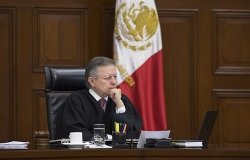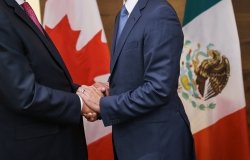Ralph Bunche, The United Nations, and The United States
Senator Paul Sarbanes (D-MD) opened a weeklong celebration of the United Nations 58th birthday with a speech at the Wilson Center about the United Nations and its relationship with the United States. Sarbanes also honored the 100th birthday of Ralph Bunche, former Under-Secretary General of the United Nations and 1950 Nobel Prize winner for peace.
Overview
Senator Paul Sarbanes (D-MD) opened a weeklong celebration of the United Nations 58th birthday with a speech at the Wilson Center about the United Nations and its relationship with the United States. Sarbanes also honored the 100th birthday of Ralph Bunche, former Under-Secretary General of the United Nations and 1950 Nobel Prize winner for peace.
Ralph Bunche, who in 1934, at Harvard, became the first African American to receive a doctorate in political science, won the United States government’s prize for the top dissertation in the country. During World War II, he was brought into the United States Office of Strategic Services and was later promoted to chief of the Africa section. While Secretary-General at the UN, Bunche was awarded the Nobel Prize for peace following his successful negotiation of an armistice between Israel and Egypt. Reluctant to accept the award, Bunche said, “Peacemaking at the United Nations is not done for prizes.” Bunche died in December, 1971, and in 1980 the United Nations honored him by creating the Ralph Bunche Park, which faces the United Nations and is dedicated to peace and Bunche’s lifelong commitment to it.
Sarbanes also expressed his regret for the death of top UN envoy to Iraq, Sergio Vieira de Mello, in a bombing of the United Nations building in Baghdad this August. Sarbanes said both Bunche and de Mello represented the best of international diplomats, without which many problems in the world would have little chance of being solved.
Sarbanes then turned his attention to the relationship between the United States and the UN. For fifty years, the Cold War paralyzed the UN Security Council because of Russian and American veto power. Nonetheless, Sarbanes said, many conflicts were still avoided because of work done in the UN. Now, with the Cold War over, Sarbanes said it is vital that America strives to make the most of international cooperation and multilateral problem solving.
Sarbanes questioned the validity of critics’ arguments that the United Nations is a burdensome organization that hinders America’s interests. “Working with the United Nations, we can achieve greater impact, at less cost than we can with unilateral action,” Sarbanes said. Equally important, Sarbanes explained, the United Nations “lends an international endorsement to actions that would otherwise be seen as the United States trying to impose a particular point of view.”
Sarbanes pointed out that even the war on terror, which many critics have suggested is hampered by any potential obligations to the United Nations, benefits tremendously from the United Nations. The UN is critical in choking off the international money supply that terrorists use to fund their operations. In addition, the UN often provides much needed troops to assist in post-conflict operations. Recently, the Security Council approved the use of UN troops outside of Kabul, the capital of Afghanistan.
While Sarbanes acknowledged the UN is flawed, and needs to be reformed to be able to better deal with 21st century problems, he pointed out that current UN Secretary General, Kofi Annan, has already begun that process with the establishment of a high panel that will examine the contribution of collective action and propose institutional and procedural reforms.
One of the single greatest problems the UN faces, Sarbanes explained, is the recent reluctance of the United States to seek international cooperation. However, Sarbanes warned, “Our children and grandchildren’s future is not dependent on military action, but on international cooperation.” The United States must be true to its commitment to the UN, which includes full payment of its financial obligations. Perhaps most importantly, the United States must reassume its leadership in the world as a country dedicated to finding global, cooperative solutions. “Historians will view us harshly if we give up our leadership,” Sarbanes concluded.
Sarbanes, Maryland’s Democratic senior Senator, made Maryland history in November, 2000 by winning reelection to an unprecedented 5th term to the United States Senate, becoming the State’s longest serving United States Senator. Sarbanes has been working for the people of Maryland for more than three decades, first as a member of the Maryland House of Delegates and then serving as a Congressman from the Third Congressional District for three terms. Since 1977, he has served with integrity and distinction in the United States Senate where he serves as the Ranking Member of the Senate Banking, Housing and Urban Affairs Committee and is a senior member of the Foreign Relations, Budget, and Joint Economic Committees.
Thank you for your interest in this event. Please send any feedback or questions to our Events staff.










